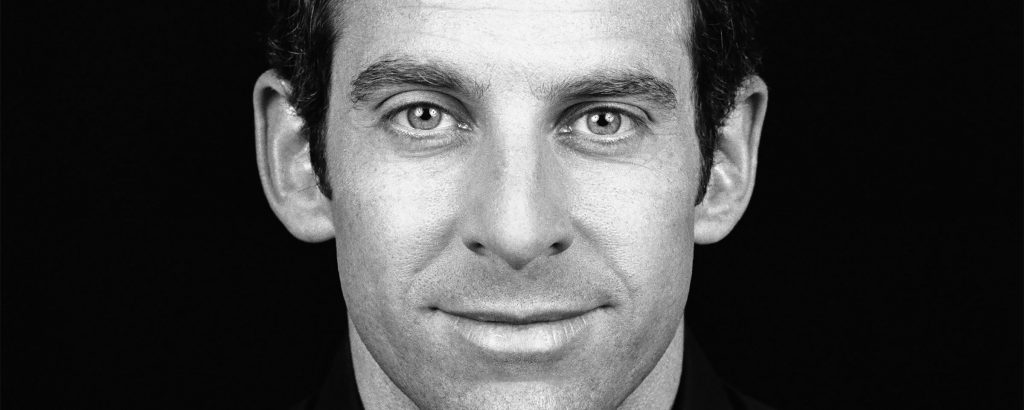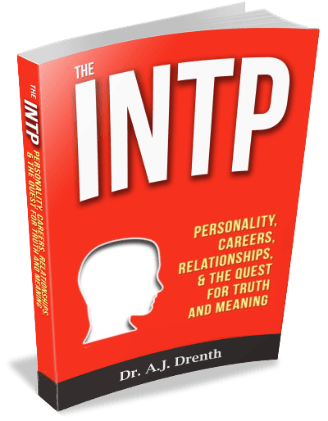
A seven-time author with degrees in philosophy and neuroscience, Sam Harris is one of the most important thinkers of our day. A self-professed “information junkie,” Harris exhibits a near encyclopedic breadth of knowledge, particularly in the realms of science, philosophy, and global politics. Known for his crystal-clear thought and communication, Harris is a master of framing, analyzing, and summarizing complex issues.
Those familiar with Harris’s work will almost certainly recognize him as an INT type. In this post, we will consider whether he is best viewed as an INTJ vs INTP. My hope is that even those unfamiliar with Harris will find this discussion edifying and useful for differentiating these two personality types.
INTJ or INTP?
Despite their shared preference for introversion (I), intuition (N), and thinking (T), the INTJ and INTP actually have no functions in common. INTJs use Ni, Te, Fi, and Se, while INTPs employ Ti, Ne, Si, and Fe. This functional disparity contributes to important cognitive and motivational differences between these types.
Having read a couple of Harris’s books and listened to many of his podcasts, I can say that I, as an INTP, have consistently appreciated the clarity and concision of his logic, not to mention many of his conclusions and prescriptions. I even resonate with Harris’s views on core philosophical matters, such as determinism and consequentialism. Having rarely enjoyed this degree of intellectual comraderie with INTJs, I initially suspected Harris to be a fellow INTP. There were, however, some typological red flags.
In exploring his book, The End of Faith, several years ago, I remember feeling uneasy with his hardline views on religion. While Harris is sympathetic toward, and to some extent even promotes, mysticism / spiritualilty, he is on the whole a scathing critic of religion. I was uncomfortable with his sweeping condemnation of religion, which he views as a sort ideational cancer. While agreeing with Harris regarding religion’s role in myriad historical atrocities, not to mention modern Jihadism, Harris seems to downplay its potential benefits or sees them as readily replaceable.
Harris’s swift dismissal of religion may be objectionable to INTPs due largely to their concerns about meaning. As discussed in my books, The INTP and The INTP Quest, INTPs are more apt to self-identity as “meaning-seekers” than INTJs. As the INTP psychiatrist and Holocaust survivor, Viktor Frankl, once attested: “Man’s search for meaning is the primary motivation of his life.”1 Such idealization of meaning is presumably due to the inferior nature of INTPs’ feeling function (Fe). Namely, because of Fe’s relative unconsciousness, INTPs may fail to experience meaning as readily as other types, which may engender real concerns about their falling prey to utter meaninglessness or nihilism. To compensate, they may enstate meaning as an ultimate goal or ideal, which is precisely what we encounter in thinkers like Frankl. With this in mind, we can better understand why INTPs may be reluctant to eliminate potential sources of meaning, including religious ones, from their existential arsenal.
INTPs may also suspect, as Jung did, that much of humanity would find it difficult to replace the bedrock of hope and meaning that religion provides. Because of their own psychological concerns about meaning, INTPs are inclined to be sympathetic toward those drawn to religion for meaning-related purposes. Thus, they often possess a higher tolerance than INTJs for those holding “irrational” beliefs for the sake of personal meaning or comfort.2 An INTP might even argue that religion is defensible insofar as it can make life more meaningful or worth living. Philosophically, this is the sort of argument one might expect to see from the existentialists (e.g., Kierkegaard) or pragmatists (e.g., William James), most of whom tend to be NP types.
Less plagued by subjective concerns about meaninglessness, INTJs are disinclined to sympathize with arguments from personal meaning. Rather than fretting over meaning (F), INTJs tend to be more preoccupied with the challenges posed by inferior sensing (Se). While these challenges may assume a variety of forms, INTJs are particularly apt to struggle with the profound sense of incongruence between their image of an ideal world (Ni) and the world as it currently exists (Se). Similar to INFJs, they are deeply convinced of the veracity of their ideals and perceptions. Ni, in tandem with Te, engenders a deep sense of knowingness, which is why INTJs are perplexed and frustrated when they encounter what they perceive as ignorant, foolish, and irrational beliefs and behaviors. Thus, many INTJs see their essential purpose as one of correcting false beliefs / perceptions, hoping that this will effectively narrow the gap between their ideals and reality. Put differently, INTJs aspire to make the world a more “rational” place, one free of the myriad ills arising from irrational thinking.
It is precisely this sort of project that we find in Sam Harris, who I am now convinced is an INTJ. The basic contours of Harris’s work are actually quite similar to those of another influential INTJ—Al Gore. Both Harris and Gore are well conceived as societal prophets. Convinced they hold the answers to what is wrong (or will go wrong) with the world, they see it as their role to enlighten humanity in order to stave off future catastrophe. Because of their strong sense of conviction, as well as the direct and unapologetic manner in which they express their perceptions and prescriptions, one can sense a certain direness in the INTJ’s message. For instance, in the closing lines of The End of Faith, Harris writes: “The days of our religious identities are numbered. Whether the days of civilization itself are numbered would seem to depend, rather too much, on how soon we realize this.” I must say that it is hard for me to imagine an INTP taking such a grave view of religion, especially of religion as a whole.
INTJs also tend to be purists and idealists with respect to truth, which they see as sacrosanct and worthy of utter seriousness. In Harris’s words, “Nothing is more sacred than the facts.”3 And “where we have no reasons, we have lost our connection to both the world and one another.”4 While INTPs are also truth seekers, their attitude toward truth is more fickle and, at times, even irreverent. One reason for this is INTPs don’t experience the same degree of conviction about what is and isn’t true. Their combined use of Ti and Ne is the perfect recipe for doubt, skepticism, ambivalence, and/or relativism, which can easily render them less respectful of, and more cavalier toward, truth as the highest ideal. In fact, INTPs often show equal or greater reverence for other ideals such as meaning, purpose, freedom, or creativity. So while truth certainly plays an important role in the INTP psyche, its status is more fragile and tenuous than it is for INTJs.
Over the course of their lives, INTJs can be seen as diligent in their construction and refinement of a single, complex framework of truth. Although INTPs also enjoy seeking and creating truth structures, they are sensitive to, and at times threatened by, excessive structure, which can leave them feeling stifled and caged in. And in the event that they feel bored or unduly restrained by a given structure, their inclination is to jettison or destroy it (even if it happens to be one they created), effectively furnishing themselves a clean slate for new explorations and creations (Ne). So while INTJs are characteristically constructive in their approach to truth, INTPs operate as both seekers and destroyers (or if you prefer, deconstructors) of structured truth. This is not to say, of course, that INTJs aren’t highly critical of what they see as false or unsubstantiated truth claims, but only that they are more consistent and loyal toward their own previously established truth structures (Ni-Te).5
Closing Remarks
I have great respect for Sam Harris. He is a brilliant and well-developed INTJ, unmatched in his conceptual and communicative clarity. Although he doesn’t share my level of sympathy for those who embrace religion, I appreciate his metaphysical openness and endorsement of spiritual practice (e.g., meditation). I also applaud his unwavering commitment to reason and evidence, which, among other things, has allowed him to transcend traditional political lines. In my experience, Harris’s intellectual honesty and logical clarity have a way of neutralizing our typological differences, thereby laying the groundwork for true objective consensus; and this, in my view, is no small feat.
Learn More about INT Types in Our Books
Learn more about INTPs and INTJs—their personality, cognition, life struggles, and much more—in our books:
Related Resources:
INTJ vs. INTP: Type Differences
Notes:
1. Frankl, V. Man’s Search for Meaning.
2. Insofar as INTPs acknowledge the value of personally meaningful beliefs, they may resonate with certain aspects of the Enneagram type Nine. In fact, it may largely be Jung’s sympathies in this respect that led the Enneagram authors Riso and Hudson to type him as a Nine. As Jung once opined, “A psychoneurosis must be understood, ultimately, as a suffering of a soul that has not discovered its meaning.” In case you were wondering, Sam Harris is likely an Enneagram Five, but with notable One (i.e., Reformer) tendencies, both of which are very common among INTJs.
3. Harris, S. The End of Faith. p. 225.
4. Ibid.
5. Nor is this to say that INTJs never act in a destructive manner. However, any destructive impulses are typically expressed through Se channels (e.g., excessive eating, drinking, spending, etc.), thus leaving their NT truth structures intact.



Tony says
Enjoyed the analysis and as an INTP and reader of Harris, sounds spot on.
Vermillion says
It’s a pity he can’t seem to transcend social constructs too. He takes a swipe at religion without acknowledging the hyper-masculine spell that fuels fundamentalism in some of them. He should try taking off those rational blue tinted spectacles and applying his considerable intellect to a world full of wonderful possibilities.
Will says
Interesting. On a side note, it may be a poor assumption to think that INTPs and INTJs consider belief in God irrational. I generally test just barely on the P side of the INTP/J divide, although I exhibit very few INTJ stereotypical behaviors versus INTP. I find that the balance of evidence in the world around me, and my own personal experiences supports the existence of a God in general, and the Christian God in particular. My mental model of the world simply does not work without him. This is not intended to convert you or sway your personal belief regarding God, just to point out that INTPs, and I’m sure, INTJs, exist in the church and participate without compromising their rational ideals. All that being said, organized religion on the level of the Catholics, or Mormons (not Christian, btw) is full of irrational practices that fly in the face of the understanding I have of God. I mean really, the Bible is not meant to be read by laypeople? That’s like a physics professor telling their students, “No, don’t read your books, I’m a professor, my superior experience in the field renders anything you might glean from Newton or Einstein’s works redundant. Just do what I say.”
Jenny says
Thanks for this article. I’m an ENTP and have a lot of respect for Sam Harris but I too have felt uncomfortable with Sam Harris’ views on religion. I think some, Christianity and Buddhism, for example have contributed greatly to humanity. However, I do agree with many of his assertions on Islam, which cannot be considered to only a religion, and Westerners make a grave mistake when they assume it is. Islams expansionist, supremacist political doctrine and laws calling for violence and the subjugation of non believers is dangerous to ignore. It is far more political than religious and the life and deeds of its founder should be examined as he is considered the perfect example for humanity and the man all good Muslims must emulate.
Henry says
“Having rarely enjoyed this degree of intellectual comraderie with INTJs, I initially suspected Harris to be a fellow INTP. There were, however, some typological red flags.”
It’s funny, my *dis*agreements with Harris led me to think he is an INTJ for exactly this reason. :-) So, I’m glad to see you’ve come around on him.
“I must say that it is hard for me to imagine an INTP taking such a grave view of religion, especially of religion as a whole.”
I think this is exactly right. Whenever I talk to or read the works of a *hardline* atheist, I think “NTJ.” It might change through further discussion, but that’s always my first thought.
INTP Technologist says
INTPs can be hardline atheists, I wouldn’t necessarily say it’s a NTJ attribute. There are many reasons a person would reject religion, even if not in a absolutist philosophy but at least from the practical (and other, e.g. societal) perspectives*.
I haven’t studied Harris thoughts too deeply (I stuck more with Hitchens) but my impression was his views are more to the idea that religion but it’s fundamental nature is bad for society, regardless of any philosophical view of it. But again that might be a naive understanding of his thinking.
* e.g., while I can’t presently prove that a teapot isn’t orbiting Jupiter, practically speaking it’s such an asymptotically unlikely event as to be effectively zero.
INTP Technologist says
Harris has the typical Ni/Te dichotomy in his views on consciousness and religion. On one side we have the Te absolutist rejection of religion but his Ni dominant can’t help but have a mysticism around consciousness. In the AI field we call such views on consciousness “intelligence fundamentalism”, the idea that you need something magical to explain intelligence and consciousness is not much different from needing the concept of a soul.
The nature of having a Type is that we all have inherent contractions, due to the oppositional nature of our psyche (e.g. Dominant versus Inferior). But only in INTJ’s (that I’m aware of) do we see such an intellectual disparity. INTP’s are more typically intellectually consistent, and the contractions show up elsewhere.
GG says
An informative, thoughtful, and well-written piece. Thank you for taking the time to write this, A.J. It clarified for me some of the key differences between INTP and INTJ.
As Ryan mentioned, I remember reading that personality types physically express themselves differently too. For example, INTPs tend to look away to the left when they are talking (Ti) while INTJs tend to look directly at the person (Te). What do you think of this theory? And is it useful?
Ryan says
Sam Harris’ demeanor and speaking style, monotonal and delivered with a consistent rhythm, reminds me a lot of my best friend and former philosophy professor. I had typed my friend as an INTP or INTJ. I’m an INTP, and seeing how we would argue even when agreeing led me to believe we were probably not exactly the same type. After begging him to take your test, he scored as an INTJ.
BTW, he loathes Sam Harris. Although they agree on Islam, he find Harris to be a weak philosopher and approves more of Daniel Dennett.
Mike says
I have great respect for Harris and his work. However, I also notice his tendency to ringfence religion-induced atrocities and conclude religious contribution to humanity is only negative. Christopher Hitchens (ENTJ?) had a similar approach, possibly more severe, claiming religious congregations ‘are all fools’ and should know better.
Religious faith, no doubt, is of benefit to many people. They get something out of it and are of greater value to society as a result.
Brenda says
Interesting article. I am a female INTJ, academic, scientist, philosopher, author & Christian. After decades of study and academic debate, I cannot but find atheism irrational. Yet, I have never felt the need to attack or ridicule atheists. I wonder whether it is a search for truth that drives atheists to attack the Christian faith (I cannot speak for other religions), or rather their anger that millions of people experience a peace & joy that eludes them. Atheists also tend to make the category mistake of confusing faith in God with the impulses that cause deranged & deluded people to commit atrocities in the name of their chosen religions.
Jillianne says
I couldn’t agree more with Sam Harris. Any one belief system that requires a differing belief system to be labeled as wrong, misguided, sinful, etc. is poisonous to society. The overwhelming human desire to be right, to have aligned oneself with the ‘correct’ belief system, effectively creates perpetrators and victims and perpetuates a worldview that there exists rightful and wrongful heirs to ‘heaven and earth’. In other words, a perfect justification for eliminating the ‘other’.
There are belief systems that do not promote rightful and wrongfulness and there are a few believers of one religion or another that believe in peaceful coexistence. This does not diminish the negative impact of religion as a whole.
Nora says
Definitely agree with you, this is a great article. I have many intp friends and their study of things including religion tends to be broader and more open, which I think is better for understanding. Ni seems to miss more, I’m an ENTP so I notice it.
I find it funny though, that the comments here are like yeah I don’t agree with what he says about religions EXCEPT for Islam. Lol. There’s so much propaganda out there against Islam that for the average person it’s going to be harder to discern what’s biased and what’s not, sifting through websites and such. You’ll find though, if you read enough, from allpoints of view/sides/sources (as in every subject) you’ll get a better understanding of it as a whole, you’ll be able to separate religion, from politics from culture. You’ll most likely realize that Islam as a religion isn’t any worse than any other religion.
Lol, good luck, seriously, it’s easier to not do the broad research sometimes, when there are so many other interesting things to read about.